-
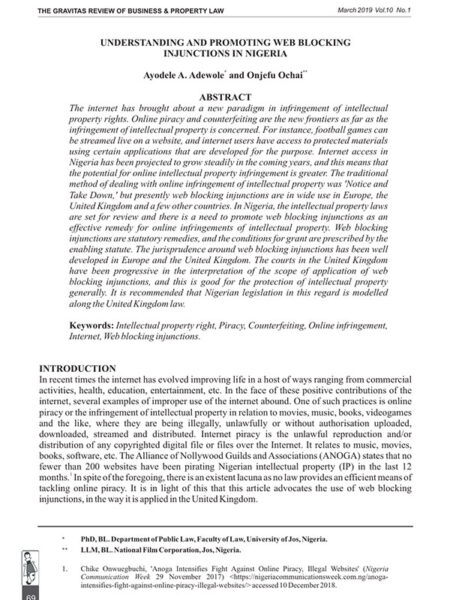
Understanding and Promoting Web Blocking Injunctions in Nigeria
0₦2,500.00Dr Ayodele Adewole of the University of Jos Nigeria,and Onjefu Ochai of the National Film Corporation Jos Nigeria, in their article, Understanding and Promoting Web Blocking Injunctions in Nigeria, observe that the internet has brought about a new paradigm in infringement of intellectual property rights. Online piracy and counterfeiting are the new frontiers as far as the violation of intellectual property is concerned. The traditional method of dealing with online infringement of intellectual property was ‘Notice and Take Down,’ but presently web blocking injunctions are in extensive use in Europe, the United Kingdom and a few other countries where the jurisprudence around web blocking injunctions has been well developed. They observe that the incorporation of measures to deal with online piracy and counterfeiting in Nigeria is long overdue, and web blocking injunctions are the favoured means of achieving this. They recommend reform of Nigerian copyright laws in line with the UK law which has greatly evolved over the course of time.
-
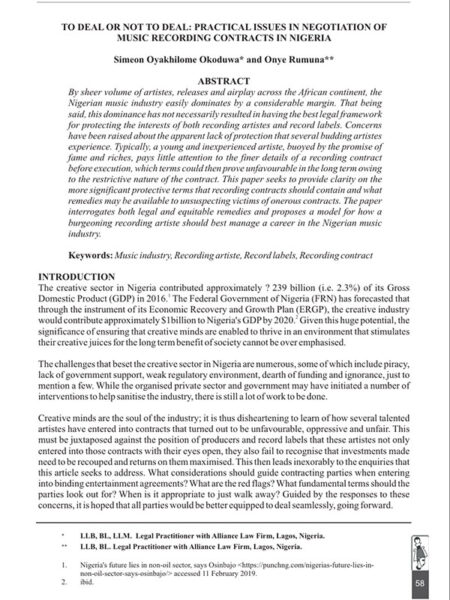
To Deal or not to Deal: Practical Issues in Negotiation of Music Recording Contracts in Nigeria
0₦2,500.00Simeon Okoduwa and Onye Rumuna of Alliance Law Firm, Lagos Nigeria in their article, To Deal or Not to Deal: Practical Issues in Negotiation of Music Recording Contracts in Nigeria, reflect that typically, a young and inexperienced artiste, buoyed by the promise of fame and riches, pays little attention to the finer details of a recording contract before execution, which terms could then prove unfavourable in the long term owing to the restrictive nature of the contract. Okoduwa and Rumuna provide clarity on the significant protective terms that recording contracts should contain and what remedies may be available to unsuspecting victims of onerous contracts. They propose a model for how a burgeoning recording artiste should best manage a career in the Nigerian music industry.
-
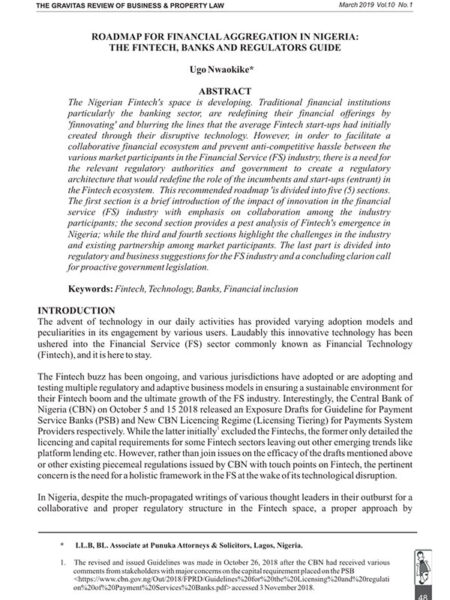
Roadmap for Financial Aggregation in Nigeria: The Fintech, Banks and Regulators Guide
0₦2,500.00Ugo Nwaokike, Associate<, Punuka Attorneys and Solicitors in his article, Roadmap for Financial Aggregation in Nigeria: The Fintech, Banks and Regulators Guide, considers that traditional financial institutions are redefining their offerings to overcome the initial head start fintech start-ups had with their disruptive technology. However, to facilitate a collaborative financial ecosystem and prevent anti-competitive hassle between the various market participants in the financial services industry, there is a need for a regulatory architecture that would redefine the role of the incumbents and entrants in the fintech ecosystem. He examines the challenges in the fintech industry and existing partnership among participants while recommending legislative, regulatory and business measures to achieve a collaborative and cohesive industry.
-
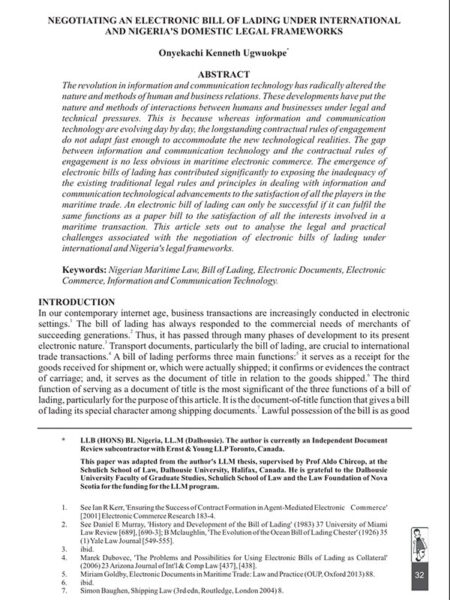
Negotiating an Electronic Bill of Lading under International and Nigeria’s Legal Frameworks
0₦2,500.00Onyekachi Ugwuokpe, Independent Document Review Subcontractor with Ernst & Young LLP Toronto Canada in his article, Negotiating an Electronic Bill of Lading under International and Nigeria’s Domestic Legal Frameworks, notes that although electronic bill of lading in shipping business has great advantages, including savings in time and monetary costs, it has been difficult to replicate the document-of-title function of a bill of lading in an electronic setting. The difficulty for an electronic bill to achieve negotiability arises from the fact that much of the relevant existing legal rules on, and commercial procedures for, negotiating bills of lading are entirely paper-based. The electronic bill of lading is also caught up with the common challenges of electronic documentation, which results from the inability of traditional contract principles to catch up with the rebellious advancements in information and communication technology. Onyekachi masterfully analyses the legal and practical challenges associated with negotiating electronic bills of lading under international and Nigeria’s legal frameworks.
-
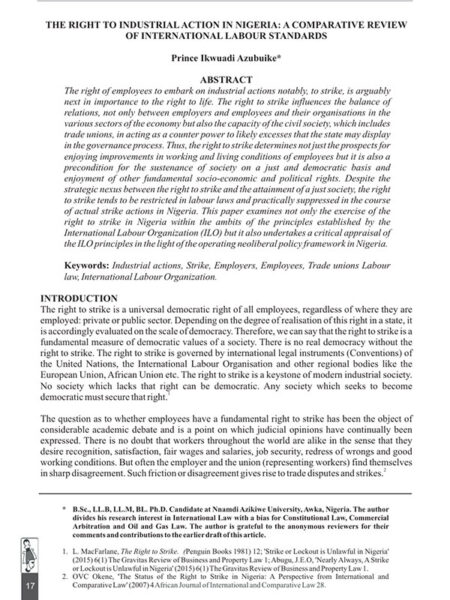
The Right to Industrial Action in Nigeria: A Comparative Review of International Labour Standards
0₦2,500.00Prince Azubuike, legal practitioner and researcher in his article, The Right to Industrial Action in Nigeria: A Comparative Review of International Labour Standards, notes that the right of employees to strike determines not just their prospects for enjoying improvements in working and living conditions, but it is also a precondition for the sustenance of a just and democratic. Despite the strategic nexus between the right to strike and the attainment of a just society, the right to strike tends to be restricted in labour laws and practically suppressed in the course of actual strike actions in Nigeria. He examines the exercise of the right to strike in Nigeria and other jurisdictions within the ambits of the principles established by the International Labour Organization (ILO).
-
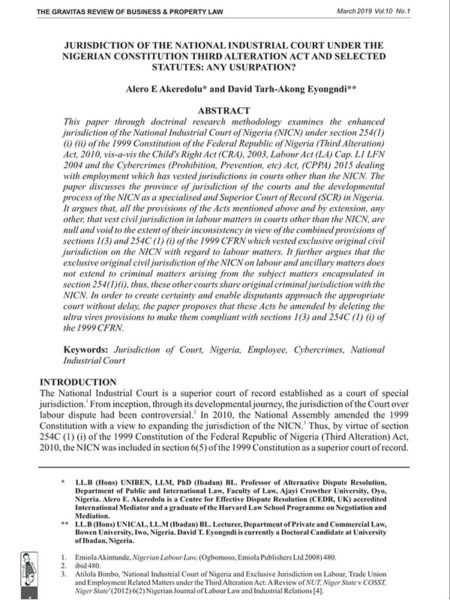
Jurisdiction of the National Industrial Court under the Nigerian Constitution Third Alteraction Act and Selected Statutes: Any Usurpation?
0₦2,500.00Professor Alero Akeredolu of Ajayi Crowther University, Oyo Nigeria and David Eyongndi of Bowen University, Iwo Nigeria in their article, Jurisdiction of the National Industrial Court under the Nigerian Constitution Third Alteration Act and Selected Statutes: Any Usurpation?, comprehensively examine the jurisdiction of the National Industrial Court. They consider whether the jurisdiction bestowed on other courts by the Labour Act, Child’s Right Act and the Cybercrimes (Prohibition, Prevention, etc.) Act in respect of employment matters contradicts the exclusive jurisdiction of the NIC under the 1999 Constitution of the Federal Republic of Nigeria (Third Alteration) Act, 2010.
-
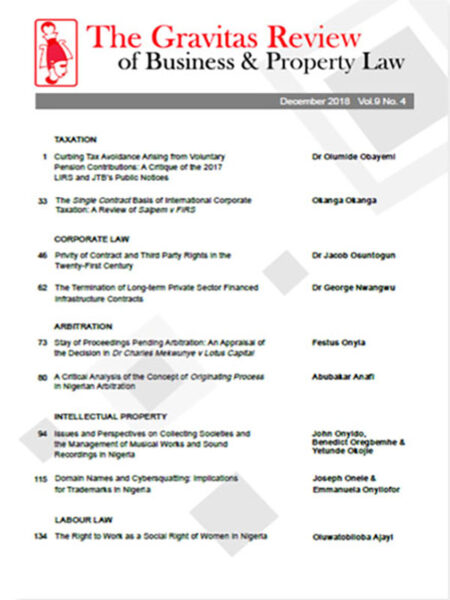
The Gravitas Review of Business & Property Law Vol.9 No.4 – Print
0₦5,000.00In this issue of The Gravitas Review of Business & Property Law Vol.9 No.4, there are well researched articles on:
- Taxation
- Corporate Law & Practice
- Arbitration
- Intellectual Property
- Labour Law
-

The Gravitas Review of Business & Property Law Vol.9 No.4 – E-Book
0₦5,000.00In this issue of The Gravitas Review of Business & Property Law Vol.9 No.4, there are well researched articles on:
- Taxation
- Corporate Law & Practice
- Arbitration
- Intellectual Property
- Labour Law
-

The Gravitas Review of Business & Property Law Vol.9 No.4
0₦5,000.00In this issue of The Gravitas Review of Business & Property Law Vol.9 No.4, there are well researched articles on:
- Taxation
- Corporate Law & Practice
- Arbitration
- Intellectual Property
- Labour Law
-
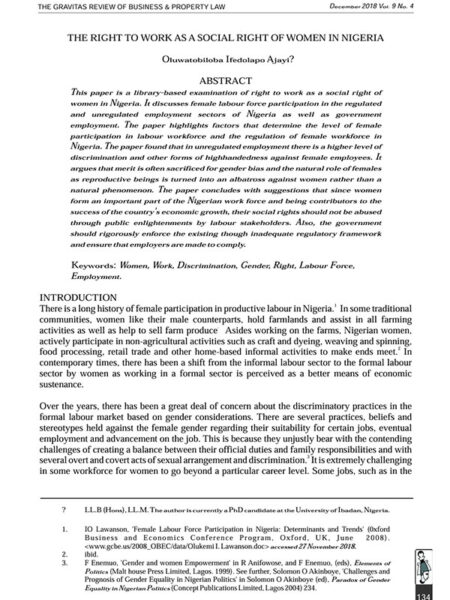
The Right to Work as a Social Right of Women in Nigeria
0₦2,500.00Oluwatobiloba Ajayi, Candidate at the University of Ibadan in her paper, The Right to Work as a Social Right of Women in Nigeria, discusses female labour force participation in the regulated and unregulated employment sectors in Nigeria. She highlights factors inhibiting advancement of women in the labour market and how laws regulating women employment in Nigeria have been inadequate. She considers employment of women in public, regulated private, and unregulated private sectors of the labour force, and concludes with recommendations on how the legal regime on employment of women could be strengthened to enhance the welfare of women employees.
-
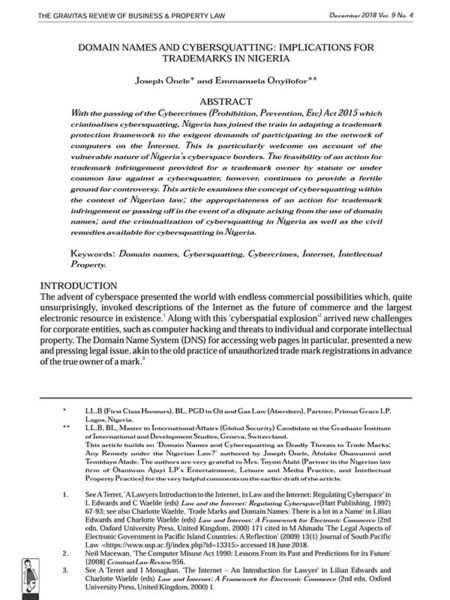
Domain Names and Cybersquatting: Implications for Trademarks in Nigeria
0₦2,500.00Joseph Onele, Partner Primus Grace LP and Emmanuela Onyilofor, Graduate Student at the Institute of International and Development Studies Geneva, in their article, Domain Names and Cybersquatting: Implications for Trademarks in Nigeria, examine the regulation of domain names and the concept of cybersquatting in Nigerian law. They consider the appropriateness of instituting an action for trademark infringement or passing off in the event of a dispute arising from the use of domain names, the criminalisation of cybersquatting as well as the civil remedies available for cybersquatting in Nigeria.
-
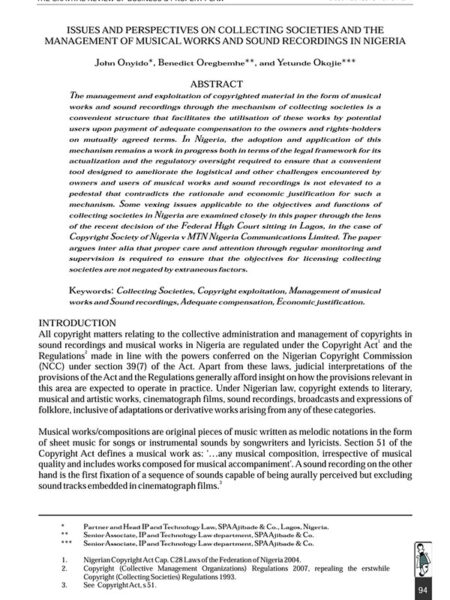
Issues and Perspectives on Collecting Societies and the Management of Musical Works and Sound Recordings in Nigeria
0₦2,500.00John Onyido, Benedict Oregbemhe, and Yetunde Okojie, Partner and Associates respectively at SPA Ajibade & Co. in their article, Issues and Perspectives on Collecting Societies and the Management of Musical Works and Sound Recordings in Nigeria, note that the management and exploitation of copyrighted materials through the mechanism of collecting societies is a convenient structure that facilitates the utilisation of musical works and sound recordings by potential users. Using the Copyright Society of Nigeria v MTN Nigeria Communications Limited as a signpost, Onyido et al consider pertinent issues relating to artistes’ relationship with collecting societies including whether original copyright owners can license their work directly without involving their collecting society; whether collecting society can institute an action without joining a member whose work was infringed; and whether a collecting society can claim royalties on behalf of non-members.
The Gravitas Review of Business & Property Law



